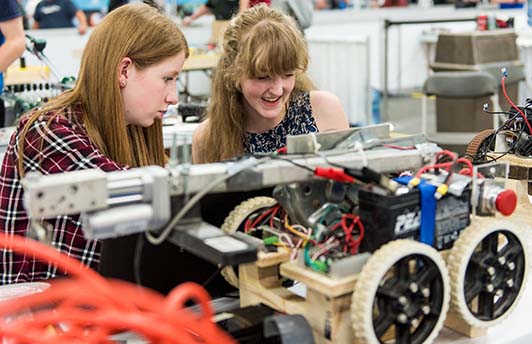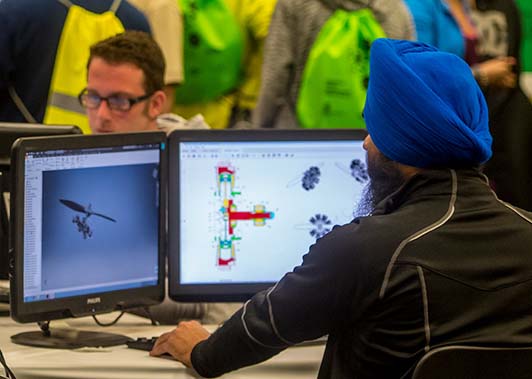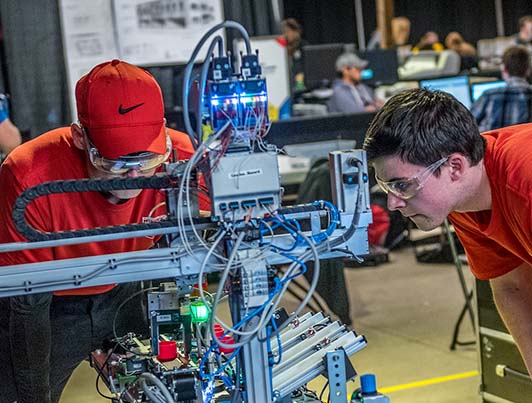Precision Machining
What is precision machining?
Precision Machinists use many machine tools, such as lathes, milling machines, grinders, and drill presses, to produce precision metal / non-metal parts. These parts must be made to exacting standards, and the machinist uses precision measuring instruments to ensure accuracy and that the parts meet quality guidelines. A machinist reads and interprets specifications and blueprints, calculates dimensions and tolerances, lays out their work and marks pieces for machining. Precision machinists often produce small batches or one-of-a-kind items. They use their knowledge of the working properties of metals and their skill with machine tools to plan and carry out the operations needed.
The job of the precision machinist combines mental ability with manual skills – to develop a project from a blueprint requires careful thought and an understanding of mathematics and design of work holding devices in conjunction with the engineering department, as well as good mechanical ability. You will be making one of kind items for research and development, tooling, fixtures and small run batches. You may be required to fit and assemble the machined metal parts and subassemblies, and verify their dimensions, strength and hardness.
Machinists perform some or all of the following duties:
- Read and interpret engineering drawings, blueprints, charts and tables or study sample parts to determine machining operation to be performed, and plan best sequence of operations
- Compute dimensions and tolerances and measure and lay out work pieces
- Set up, operate and maintain a variety of machine tools including computer numerically controlled (CNC) tools to perform precision, non-repetitive machining operations such as sawing, turning, milling, boring, planing, drilling, precision grinding and other operations
- Fit and assemble machined metal parts and subassemblies using hand and power tools
- Verify dimensions of products for accuracy and conformance to specifications using precision measuring instruments
- May set up and program machine tools for use by machining tool operators.
HOW TO JOIN THE FIELD
Completion of secondary school is usually required.
Completion of a four-year apprenticeship program or A combination of over four years of work experience in the trade and some college or industry courses in machining is usually required to be eligible for trade certification.
Trade certification for machinists is available, but voluntary, in all provinces and territories.
Trade certification for automotive machinists is available, but voluntary, in Ontario.
Trade certification for machinists (CNC) is available, but voluntary, in New Brunswick.
Interprovincial trade certification (Red Seal) is also available to qualified machinists.
Several years of experience as a machinist, tool and die maker or machining tool operator may be required for machining and tooling inspectors.
INDIGENOUS AND REMOTE CONSIDERATIONS
Many Indigenous and remote communities do not have the same access to information and experience when it comes to science, mathematics and technology fields. This would likely mean that students from these communities may need extra support when they are pursuing this field both in post-secondary school, as well as on-the-job.
Indigenous and remote communities are catching up to southern Canada when it comes to digital technology and computer skills and industries. Not all communities have access to reliable, affordable internet and service interruptions are all too common. Access to computers at home is not a given for everyone and Elders and even sometimes younger generations lack computer knowledge, although this situation is undergoing some significant changes at the moment. But even those people in Indigenous and remote communities with interest and high-level skills in computers may not have the same access to opportunities to learn about different programs and may face significant bandwidth issues, limiting their ability to learn and develop in this field. Indigenous and remote students may need qualifying courses or need to augment college learning to be successful in this field.
Although with significant improvements currently underway to internet connections in Indigenous and remote communities, careers in this field become more viable and are likely to become more so in years to come.
DISABILITY CONSIDERATIONS
As this field involves both complex thinking and analysis as well as physical operation, people with physical, intellectual and learning disabilities may need accommodations in order to be successful.
Find the right career path for you with our interactive map!
Trouvez le cheminement de carrière qui vous convient grâce à notre carte interactive!
Sample Job Titles
- Tool and die maker
- Machining and tooling inspector
- Machine tool set-up operator
- CNC Machinist
- Machine shop inspector
Companies and Sectors
- Manufacturing industry
- Transport and trade industry
- Metal fabrication/production
- Machine shops

Precision Machining and the Skills for Success Program
The key Skills for Success for this career path are:
- Reading
- Numeracy
- Problem Solving




